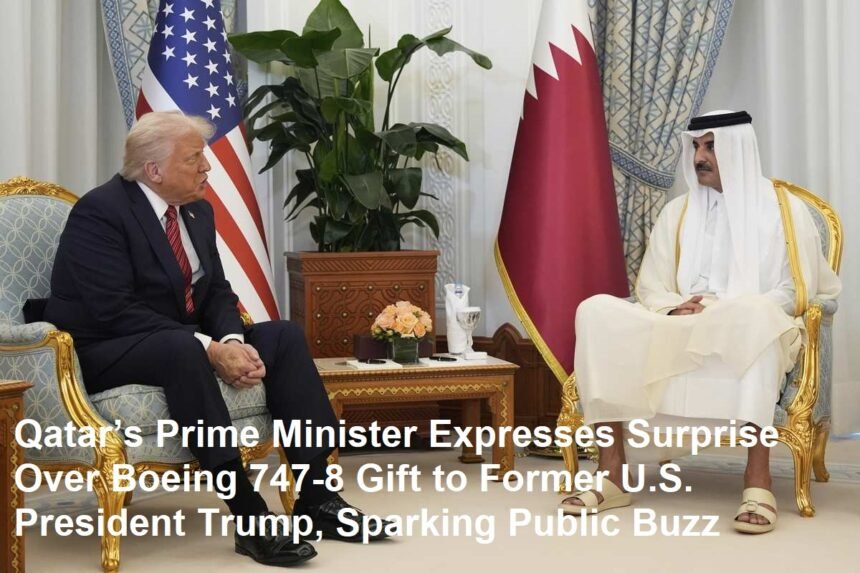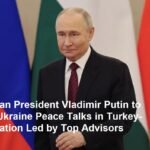In a surprising turn of events, Qatar’s Prime Minister Sheikh Mohammed bin Abdulrahman bin Jassim Al Thani recently expressed confusion and astonishment regarding the gifting of a Boeing 747-8 aircraft from Qatar to former U.S. President Donald Trump. This unexpected revelation has stirred considerable public interest and media attention, raising questions about the circumstances surrounding the gift, its diplomatic implications, and the reactions from various stakeholders.
The Boeing 747-8, often referred to as the “Queen of the Skies,” is one of the largest and most iconic commercial aircraft in the world. Known for its distinctive hump and long-range capabilities, it has been a symbol of prestige and power, frequently used by heads of state and major airlines. The decision by Qatar to present such a significant and valuable aircraft as a gift to Donald Trump is unusual and has naturally attracted widespread curiosity.
Prime Minister Sheikh Mohammed’s public expression of confusion suggests that the gift may not have been fully anticipated or coordinated at the highest levels of Qatar’s government. This has led to speculation about whether the gesture was initiated by a particular faction within the government, a private entity, or as part of a broader diplomatic strategy that was not clearly communicated. The Prime Minister’s reaction highlights the complexities and sometimes opaque nature of high-level diplomatic gifts, especially those involving assets of substantial value.
The gifting of a Boeing 747-8 to a former U.S. president carries significant symbolic weight. Such a gesture could be interpreted as a sign of strong bilateral relations, personal goodwill, or an attempt to foster closer ties between Qatar and influential figures in the United States. It may also reflect Qatar’s desire to showcase its wealth, technological sophistication, and status as a major player in global aviation and diplomacy. However, the Prime Minister’s surprise indicates that the gift’s origins and intentions might be more complicated than a straightforward diplomatic offering.
Public reaction to the news has been mixed, with some expressing admiration for the grandeur of the gift and others questioning its appropriateness and the message it sends. Critics have raised concerns about the cost and practicality of maintaining such a large aircraft, especially given the environmental and economic considerations in today’s world. Supporters, on the other hand, view it as a bold and generous gesture that underscores Qatar’s commitment to fostering international relationships.
The media buzz surrounding the incident has also sparked discussions about the role of luxury and symbolism in international diplomacy. Gifts between nations and leaders often serve as tools of soft power, conveying respect, alliance, or strategic intent. However, when such gifts involve high-value items like a Boeing 747-8, they can also provoke scrutiny regarding transparency, governance, and the motivations behind them.
From a logistical perspective, the transfer of a Boeing 747-8 involves considerable complexity. The aircraft requires specialized maintenance, crew training, and operational infrastructure. Questions have arisen about how the aircraft will be managed, who will bear the costs, and whether it will be used for official purposes, private use, or other functions. These practical considerations add another layer to the public’s fascination and the Prime Minister’s apparent bewilderment.
The incident also sheds light on the broader relationship between Qatar and the United States. Qatar has long been a strategic partner of the U.S. in the Middle East, hosting important military bases and engaging in extensive economic and cultural exchanges. The gift of such a prestigious aircraft could be seen as an extension of this partnership, aiming to strengthen ties beyond formal diplomacy. Yet, the Prime Minister’s reaction suggests that internal dynamics within Qatar’s leadership may influence how such gestures are perceived and managed.
In conclusion, the unexpected gifting of a Boeing 747-8 from Qatar to former U.S. President Donald Trump, coupled with Prime Minister Sheikh Mohammed bin Abdulrahman bin Jassim Al Thani’s public confusion, has created a fascinating episode in international relations. It highlights the intricate interplay of diplomacy, symbolism, governance, and public perception. As the story unfolds, it will be important to observe how Qatar manages the situation, clarifies the intentions behind the gift, and addresses the practical and political questions it raises. This event serves as a reminder of the complexities inherent in high-profile diplomatic gestures and the powerful reactions they can provoke on the global stage.









